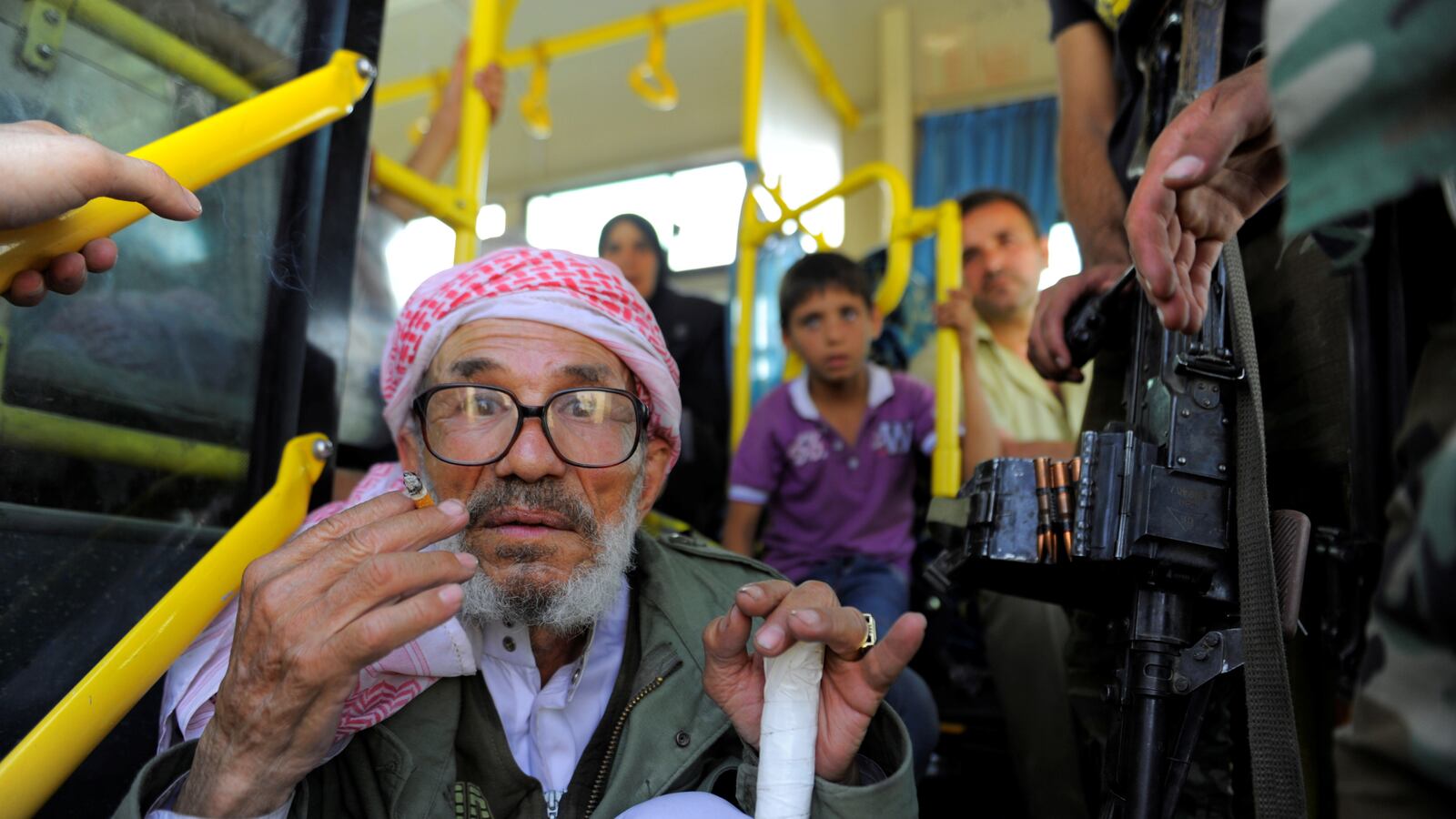ISTANBUL — Hundreds of civilians and rebel fighters abandoned the Damascus suburb of Daraya on Friday, boarding buses after a negotiated surrender that ended one of the longest sieges of the Syrian war and marked the latest victory in the Assad regime’s surrender-or-starve military campaign. International observers voiced fears of another Srebrenica, the July 1995 massacre where Serbs captured the east Bosnian enclave after a three-year siege and then executed 8,000 captive Muslim men and boys.
There was no international supervision nor support for the operation, and armed Shabiha, the regime’s ill-trained militias, boarded each bus as it left the devastated city. Live shots broadcast by a Beirut TV channel showed the buses crawling through crowds of cheering Shabiha, but no interviews with evacuees.
Relatives said townspeople felt abandoned by the world, despondent to be leaving their homes and deeply fearful as they proceeded to an unknown fate.
Daraya, once home to more than 200,000, has been under siege since November 2012 and received only one shipment of food aid and one of medical supplies, both last June. After a fierce regime offensive this summer that seized their farmlands and destroyed their sole field hospital one week ago, they had run out of food, water, ammunition, and medical care.
Residents said they had no choice but surrender.
“We reached a terrible stage,” said Hussam Ayash, an activist and former member of the local council in a Facebook message exchange. “The regime captured our farmland. Our hospital ran out of services.”
While the initial evacuation appeared to go without incident, the journey to rebel-held Idlib province or camps for the internally displaced was fraught with risk. State news media said some 400 fighters and families left for Idlib province and 600 civilians went to Qadsaya and Harjalleh, two government-controlled enclaves in western Ghouta where they would join thousands of other internally displaced.
There was no written agreement spelling out the details of the exodus, and an enormous discrepancy in the numbers, with city officials saying there were more than 8,000 civilians, and Syrian government agencies using the figure of 4,000.
“We find the agreement unsettling,” said Elise Baker, research coordinator at Physicians for Human Rights, a U.S.-based group. She expressed fear that Daraya residents would be detained arbitrarily, which had occurred repeatedly following negotiated cease-fires with other Syrian towns. She said residents, already the victims of “countless war crimes,” should have the choice of staying in their homes.
Valerie Szybala, executive director at the Syria Institute, a nonprofit research group, feared the arrest of evacuees, forced military conscription, relocation to other besieged areas and the denial of the right of residents to return to their homes. “You know the situation is bad when you hope that it is just ethnic cleansing, and that the population will be safely moved elsewhere instead of killed, arrested, and abused, as we have seen in past forcible surrender situations,” Szybala told The Daily Beast.
The decision to abandon the town, reached Thursday after nearly a month of negotiations, appears to have embarrassed both the United Nations, charged by the world community with keeping besieged towns like Daraya alive, and to the International Committee of the Red Cross, which ordinarily plays a lead role in any organized movements of civilians in wartime.
Calling the situation in Daraya “extremely grave,” UN special envoy Staffan de Mistura said that the UN had neither been consulted nor involved in the negotiations, and he only learned of the agreement Thursday evening.
He appealed to Russia and the United States to ensure that implementation of the agreement and its aftermath is in compliance with international law.
U.S. Secretary of State John Kerry was meeting his Russian counterpart, Sergey Lavrov, in Geneva on Friday to discuss Syria, but there was no sign they intended to take ownership of a situation beyond their control.
It took de Mistura 19 hours to issue his statement following a query by The Daily Beast on Thursday evening. And while he said he was taken by surprise, townspeople in Daraya said the UN was updated on the negotiations almost daily.
“We have been in contact with De Mistura’s office in Damascus, and they are fully acquainted with the agreement,” said Ayash, the former city councilman. “We asked them to be the monitors for this agreement, but frankly, we never heard back from them.”
The Syria Institute’s Szybala was withering in her criticism of the supranational body. “The UN took no action to protect civilians from this fallout,” she said. “Their efforts began and ended with that insufficient aid convoy in June. This is the epitome of negligence.”
The International Committee of the Red Cross said it had been aware of the negotiations but said it was not involved in them and was playing no role in the transfer of civilians.
“To be able to fulfill our tasks, we would need necessary guarantees that humanitarian relief workers will be respected and protected,” said Ingy Sedky, an ICRC spokeswoman in Damascus.
Despite a military onslaught as intense as anywhere in Syria, Daraya has long been known for having one of the most stable and resilient rebel forces—two moderate units of the Free Syrian Army umbrella group that have long been under the control of a civil administration.
Since January 2014, when the Assad regime began attacking opposition held areas with barrel bombs—old barrels filled with shrapnel and explosives—its helicopters dropped 8,940 on Daraya, according to city statistics. From July 1 to Aug. 16, 886 bombs or shells targeted the city, more than double the number of the preceding four months, according to Western humanitarian aid officials.
All the vital structures for the survival of the population were targeted—houses, roads, mosques, water networks, and electricity facilities—but the crowning blows came during August, when the regime deliberately targeted the city’s food supply and attempted to burn major facilities with incendiary bombs.
“We have been under siege for four years,” said Ayash, the local activist. “We depend on the food we plant ourselves. All the people in Daraya can live on one meal a day. But in the last three months, all the crops were destroyed, and the regime captured our farming area,” he said.
City defense organizers counted 54 barrel bombs with what they said was napalm, an inflammable liquid that starts fires that cannot be doused with water. Human Rights Watch, the independent monitoring group, said the weapon may not be napalm, but it more probably an incendiary weapon banned under international treaty.
—With additional reporting by Michael Weiss






